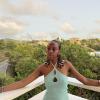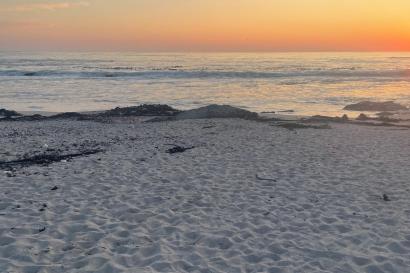There is no denying that there is tons to do in Cape Town, and in the beginning of a semester abroad, it might feel like you have weeks to do everything you want to do. When it comes to your South African bucket list, you might have things like climbing Table Mountain, hitting up the Waterfront, partying on Long Street, going on a safari, and about a billion other things. But more than anything, it is so important to experience the things that will give you a better understanding of the formation of this country, and all the stepping stones to get to where it is today.
Yes, I'm talking about museums, and when it comes to South Africa, there are tons. In the two-and-a-half months I've been here, I've been to a bunch of them, both through IES trips and independently. There's the District Six Museum, which tells the story about a vibrant community in Cape Town that was demolished after the land it was on was declared a 'whites' area. Of course, there's Robben Island, which offers tours through the prison and goes into detail on what political prisoners' every day life looked like as they served their sentencing under Apartheid. You can even get a tour around Parliament here, and see the more political history of the country.
But there are two museums that stick out in my mind and offer two very different, yet very important looks into the South African story. The first is Slave Lodge in Cape Town. Located on the same road as Parliament, the Slave Lodge Museum is housed in the same building that was used as a functional slave lodge when slave trade was at its peak in the 18th and 19th century. The museum walks you through how people would be taken from their communities, brought to the slave lodge to either be sold to white colonials in Cape Town, or sent by ship to another destination on the trade route. As you walk through the rooms, you get to see what it was like for someone living in the Slave Lodge as they awaited what came next for them. On the second floor, there are smaller exhibits that compliment the main event downstairs. When I went, the exhibits upstairs had to do with African freedom songs during Apartheid and how colonialism and African fashion melded together since colonization. As Americans, we learn a lot about slavery and slave trade as we grow up through the years at school, but we are never given a clear picture on what those things looked like on the other side of the world. Although the subjects of slavery are not new to us, South Africa can give us a different vantage point about a subject we think we know all about from social studies classes.
The other museum that I think is extremely important isn't located in Cape Town. If you ever find yourself in Johannesburg for longer than a day, definitely make it a priority to go the Apartheid Museum. This place goes into incredible detail on Apartheid, from early colonization, all the way through 1994, when South Africa became a democracy and voted Nelson Mandela into presidency. It covers every facet of that time, with not only stories about the suffering and uprisings that took place, but real video footage of the violence that occurred as people struggled for their equality.
For me, it was important to dig deeper into the events surrounding Apartheid because somehow it feels close to home for me. Sure the Slave Lodge touches on a time that happened centuries ago, but Apartheid was very much alive a little over 20 years ago. I was born in February of 1994, when a lot of the fighting and violence was coming to a head before elections. As I went through this museum and saw the images of people literally dying for their freedom, I was constantly reminded about how my life could have been painfully different if I happened to be born in a different corner of the world. Certain things we don't choose, like where and to whom we're born. Young men and women in my generation are considered the people that were "born free" in South Africa. They were either too young, or completely missed the period of Apartheid that their parents know all too well. But how might my life have been different if I were born at the same time, but in a different place? How might my life have been touched by the events that happened here?
I realize I'll never know, but the feeling is there all the same. And taking the initiative to see for yourself the history of the city you're living in should be of the utmost importance while you're here. In South Africa, the only way to really see, experience, and understand the culture is to take the time to learn about their past.

Cortney Cordero
<div>Cortney Cordero is a senior majoring in journalism at Hofstra University with a minor in creative writing. This New <span style="font-size: 13.0080003738403px; line-height: 1.538em;">Yorker has wanted to travel to Africa since she was in Kindergarten. This fall, her dream is finally coming true, and she </span><span style="font-size: 13.0080003738403px; line-height: 1.538em;">wants to share her experience with you.</span></div>







